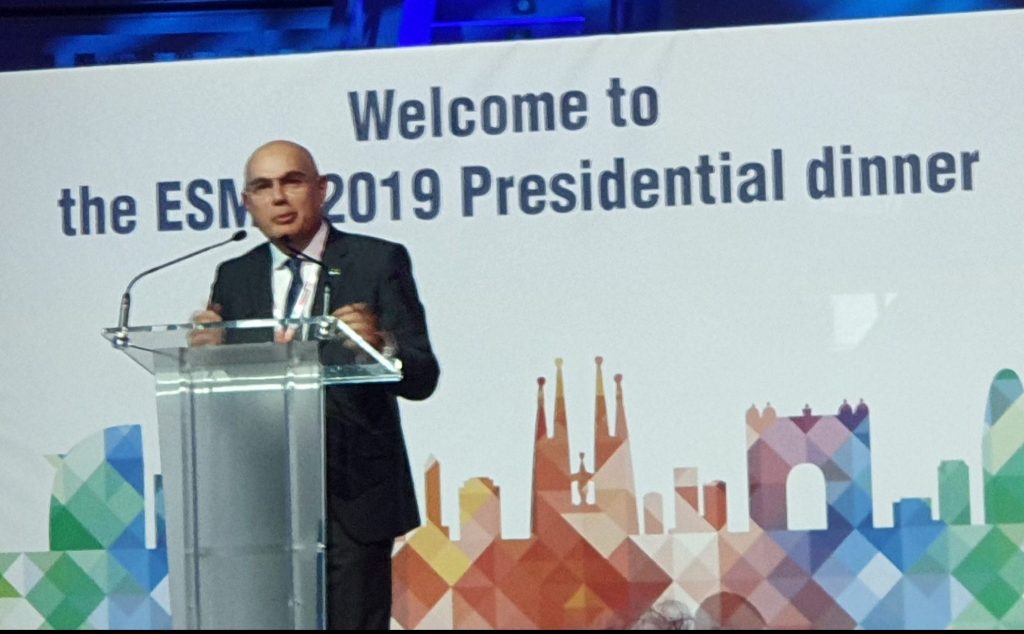EV-103 is an ongoing, multicohort, open-label, multicentre phase 1 trial of investigational drug enfortumab vedotin alone or in combination with a different drug, evaluating safety, tolerability, and efficacy in muscle-invasive, locally advanced, and first- and second-line metastatic urothelial cancer. Enfortumab vedotin is a first-in-class antibody-drug conjugate designed to target nectin-4, a protein present on almost all urothelial tumour cells, coupled to the microtubule disrupting agent monomethyl auristatin E. This initial analysis reported on 45 patients (5 from the dose-escalation cohort and 40 from the dose-expansion cohort A) with locally advanced and/or metastatic urothelial cancer who were ineligible for treatment with cisplatin-based chemotherapy, who had been treated with enfortumab vedotin (1.25 mg/kg) plus pembrolizumab in the first-line setting.
The primary outcome measure of the cohorts was safety. Secondary outcomes included objective response rate (ORR), disease control rate (DCR), duration of response (DOR), and overall survival (OS). DOR and OS were not mature at the time of analysis.
Half of patients (23/45) had an adverse event greater than or equal to grade 3. Among these events, an increase in lipase was the most frequent (13%; 6/45). In total, 4 patients (9%) discontinued treatment due to treatment-related adverse events, most commonly peripheral sensory neuropathy. There was 1 death deemed to be treatment-related by the investigator, attributed to multiple organ dysfunction syndrome. Treatment-related adverse events of clinical interest that were greater than or equal to grade 3 were rash (11%; 5/45), hyperglycaemia (7%; 3/45), and peripheral neuropathy (4%; 2/45); these rates were similar to those observed with enfortumab vedotin monotherapy. One in ten (5/45) of patients had treatment-related immune-mediated adverse events of clinical interest greater than or equal to grade 3 that required the use of systemic steroids (one event each of pneumonitis, dermatitis bullous, hyperglycaemia, tubulointerstitial nephritis, myasthenia gravis). None of the adverse events of clinical interest were grade 5.
The data demonstrated the combination of enfortumab vedotin plus pembrolizumab reduced tumours, resulting in an ORR of 71% (32/45; 95% CI 55.7-83.6). The complete response rate was 13% (6/45), 58% (26/45) of patients had a partial response, and 22% (10/45) had stable disease. Almost all (91%) responses were observed at the first assessment.
- Hoimes C et al. ESMO Congress 2019. Abstract 901O.
Posted on
Previous Article
« Nivolumab improves OS in advanced oesophageal cancer Next Article
Combination of PARP inhibition plus chemotherapy in ovarian cancer »
« Nivolumab improves OS in advanced oesophageal cancer Next Article
Combination of PARP inhibition plus chemotherapy in ovarian cancer »
Table of Contents: ESMO 2019
Featured articles
Interview with ESMO President Prof. Josep Tabernero
Breast Cancer
Triple negative breast cancer gets positive news: KEYNOTE-522 interim results
CDK4/6 inhibitors change landscape of breast cancer treatment: 2 studies
Veliparib-chemo combo prolongs survival without disease progression in some advanced breast cancer patients
Lung Cancer
Improved response rates without survival benefit with pembrolizumab in pretreated mesothelioma
Frontline ipilimumab/nivolumab improves OS in advanced NCLSC
First-line osimertinib significantly lengthens OS in NSCLC
Liquid biopsy to decide the best treatment for NSCLC
Melanoma
Long-term data from CheckMate 067
Adjuvant nivolumab provides benefit
Nivolumab+ipilimumab superior to monotherapy for melanoma brain metastases
GI Cancers
Preoperative chemotherapy for colon cancer
Nivolumab improves OS in advanced oesophageal cancer
Liquid biopsy identifies relapse in patients with colorectal cancer after surgery
In hepatocellular carcinoma, CheckMate 459 misses OS endpoint, but some interesting trends emerge
Heavily pre-treated GIST: ripretinib improves PFS
FGFR2+ cholangiocarcinoma: pemigatinib active as second-line treatment
IDH1+ cholangiocarcinoma: phase 3 results show improved PFS
Advanced colorectal cancer and BRAF mutations: triplet combination improves survival
Genitourinary Cancers
25% reduction in the risk of death in patients with nmCRPC treated with apalutamide
Enfortumab vedotin and pembrolizumab in advanced bladder cancer: initial results
PARP inhibition in selected patients slows progression on advanced prostate cancer
PFS extension with immunotherapy + chemotherapy in urothelial cancer
Third-line in mCRPC: CARD trial
Prostate cancer: spare radiotherapy after surgery
Novel mode of action for kidney cancer treatment
Gynaecological Cancers
Ovarian cancer patients benefit from combined maintenance therapy
Combination of PARP inhibition plus chemotherapy in ovarian cancer
PFS benefit with niraparib as first-line maintenance in ovarian cancer
CNS Tumours
Ceritinib in ALK+ NSCLC brain metastases
Solid Tumours/Pan-Tumour Data
Mixed data: AMG 510 in tumours with KRASG12C
DNA profiling of carcinoma of unknown primary should inform treatment
Larotrectinib: safe and effective in TRK fusion-positive tumours
Related Articles
November 26, 2019
FGFR2+ cholangiocarcinoma: pemigatinib active as second-line treatment

November 26, 2019
Interview with ESMO President Prof. Josep Tabernero
© 2024 Medicom Medical Publishers. All rights reserved. Terms and Conditions | Privacy Policy
HEAD OFFICE
Laarderhoogtweg 25
1101 EB Amsterdam
The Netherlands
T: +31 85 4012 560
E: publishers@medicom-publishers.com

